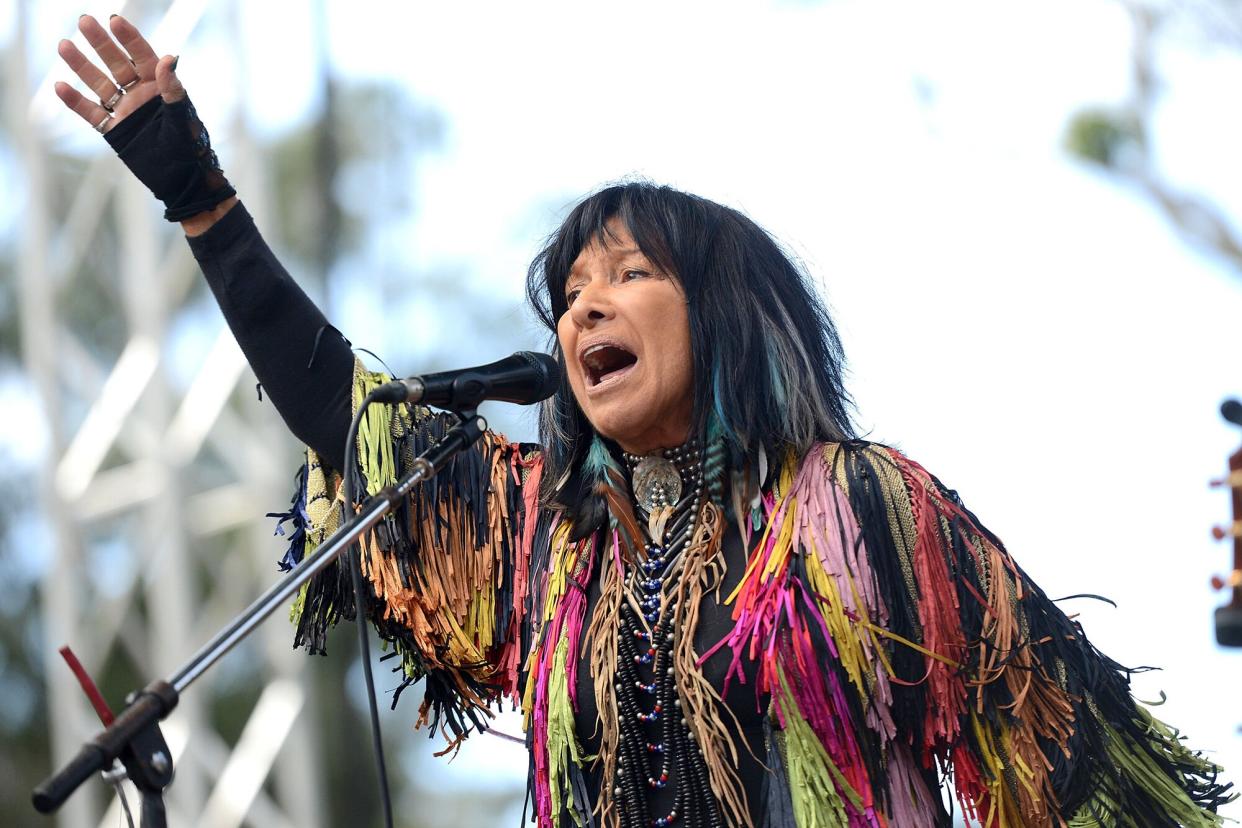Oscar winner Buffy Sainte-Marie defends heritage as report raises questions about her Indigenous roots

- Oops!Something went wrong.Please try again later.
Scott Dudelson/Getty Images Buffy Sainte-Marie
For the past four decades, singer and songwriter Buffy Sainte-Marie has been hailed as the first Indigenous person ever to win an Oscar, for co-writing the song "Up Where We Belong" for the film An Officer and a Gentleman. But now Sainte-Marie is defending herself against questions about her heritage raised in a detailed investigation by the Canadian Broadcasting Corporation.
Sainte-Marie, 82, has long claimed that she was born on tribal land and adopted by white parents, and that as a result she has no birth certificate. The CBC, however, said in a report published Friday (and an accompanying episode of the documentary series The Fifth Estate) that it had obtained a birth certificate saying Sainte-Marie was born to parents of European ancestry in Massachusetts.
The CBC reported that it was tipped off to the birth certificate hailing from the town of Stoneham, Mass., in which "Beverly Jean Santamaria" and her parents are all listed as white. The CBC also said it had the document authenticated by Stoneham town clerk Maria Sagarino.
Sainte-Marie denounced the allegations about her heritage in a preemptive statement posted to social media Thursday.
"I am proud of my Indigenous-American family, and the deep ties I have to Canada and my Piapot family," Sainte-Marie wrote, referring to the Cree family that officially adopted her as a young adult in the '60s. She added, "My Indigenous identity is rooted in a deep connection to a community which has had a profound role shaping my life and my work."
My Truth As I know it - Buffy pic.twitter.com/CZjBMOcKP9
— Buffy Sainte-Marie (@BuffySteMarie) October 26, 2023
She also said that the CBC's investigation "forced me to relive and defend my experience as a survivor of sexual abuse which I endured at the hands of my brother," Alan St. Marie.
According to the CBC's report, Sainte-Marie did not make such allegations against her brother until he started disputing her claims of Indigenous ancestry in correspondence with various media outlets (including the Denver Post and PBS public radio) in the early '70s, after which she sent him a letter. She did not make these accusations publicly until her 2018 autobiography. Since Alan died in 2011, he is unable to respond to his sister's claims (nor can the other family member Sainte-Marie now claims was also involved in the abuse, since she does not name them), although Alan did refer to Sainte-Marie's original letter as "the most vile letter I have ever read" in correspondence to their mother obtained by the CBC.
Digging into newspaper reports from the beginning of Sainte-Marie's musical career in 1963, the CBC found that "in the space of those 10 months, she was referred to as Algonquin, full-blooded Algonquin, Mi'kmaq, half-Mi'kmaq, and Cree." According to one of the CBC's expert sources, lawyer and "Indigenous identity fraud" expert Jean Teillet, these mix-ups are hardly incidental, since those nations hail from different parts of Canada. The Mi'kmaq live on the East Coast, Algonquin people are from Ontario and northern Quebec, and Cree people are primarily from the prairies.
Sainte-Marie is not the only public figure to have been accused of faking her Indigenous heritage. After the 2022 death of Sacheen Littlefeather, the activist who declined Marlon Brando's Oscar on stage in 1973, her surviving sisters called her a "fraud."
You can read Sainte-Marie's full statement and watch the Fifth Estate episode about her, titled "Making an Icon," above.
Sign up for Entertainment Weekly's free daily newsletter to get breaking TV news, exclusive first looks, recaps, reviews, interviews with your favorite stars, and more.
Related content:

